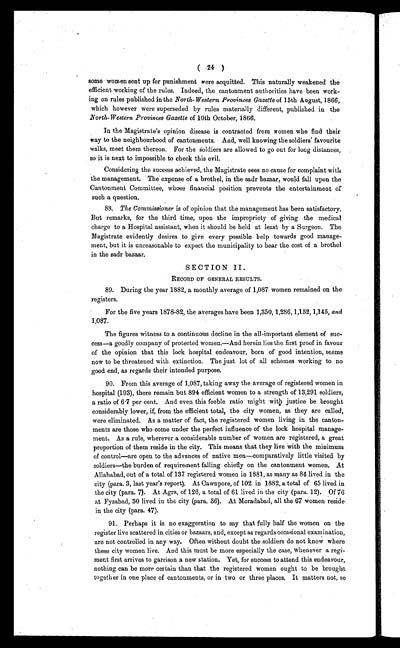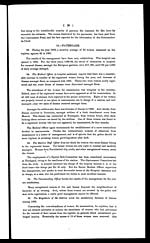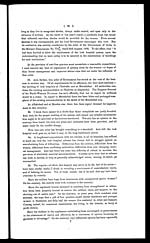Medicine - Institutions > Lock hospitals > Annual report on the working of the lock hospitals in the North-Western Provinces and Oudh > 1882
(334) Page 24
Download files
Individual page:
Thumbnail gallery: Grid view | List view

( 24 )
some women sent up for punishment were acquitted. This naturally weakened the
efficient working of the rules. Indeed, the cantonment authorities have been work-
ing on rules published in the North-Western Provinces Gazette of 15th August, 1866,
which however were superseded by rules materially different, published in the
North-Western Provinces Gazette of 10th October, 1866.
In the Magistrate's opinion disease is contracted from women who find their
way to the neighbourhood of cantonments. And, well knowing the soldiers' favourite
walks, meet them thereon. For the soldiers are allowed to go out for long distances,
so it is next to impossible to check this evil.
Considering the success achieved, the Magistrate sees no cause for complaint with
the management. The expense of a brothel, in the sadr bazaar, would fall upon the
Cantonment Committee, whose financial position prevents the entertainment of
such a question.
88. The Commissioner is of opinion that the management has been satisfactory.
But remarks, for the third time, upon the impropriety of giving the medical
charge to a Hospital assistant, when it should be held at least by a Surgeon. The
Magistrate evidently desires to give every possible help towards good manage-
ment, but it is unreasonable to expect the municipality to bear the cost of a brothel
in the sadr bazaar.
SECTION II.
RECORD OF GENERAL RESULTS.
89. During the year 1882, a monthly average of 1,087 women remained on the
registers.
For the five years 1878-82, the averages have been 1,350, 1,286, 1,152, 1,145, and
1,087.
The figures witness to a continuous decline in the all-important element of suc-
cess—a goodly company of protected women.—And herein lies the first proof in favour
of the opinion that this lock hospital endeavour, born of good intention, seems
now to be threatened with extinction. The just lot of all schemes working to no
good end, as regards their intended purpose.
90. From this average of 1,087, taking away the average of registered women in
hospital (193), there remain but 894 efficient women to a strength of 13,291 soldiers,
a ratio of 6.7 per cent. And even this feeble ratio might with justice be brought
considerably lower, if, from the efficient total, the city women, as they are called,
were eliminated. As a matter of fact, the registered women living in the canton-
ments are those who come under the perfect influence of the lock hospital manage-
ment. As a rule, wherever a considerable number of women are registered, a great
proportion of them reside in the city. This means that they live with the minimum
of control—are open to the advances of native men—comparatively little visited by
soldiers—the burden of requirement falling chiefly on the cantonment women. At
Allahabad, out of a total of 137 registered women in 1881, as many as 84 lived in the
city (para. 3, last year's report). At Cawnpore, of 102 in 1882, a total of 65 lived in
the city (para. 7). At Agra, of 126, a total of 61 lived in the city (para. 12). Of 76
at Fyzabad, 30 lived in the city (para. 36). At Moradabad, all the 67 women reside
in the city (para. 47).
91. Perhaps it is no exaggeration to say that fully half the women on the
register live scattered in cities or bazaars, and, except as regards occasional examination,
are not controlled in any way. Often without doubt the soldiers do not know where
these city women live. And this must be more especially the case, whenever a regi-
ment first arrives to garrison a new station. Yet, for success to attend this endeavour,
nothing can be more certain than that the registered women ought to be brought
together in one place of cantonments, or in two or three places. It matters not, so
Set display mode to: Large image | Zoom image | Transcription
Images and transcriptions on this page, including medium image downloads, may be used under the Creative Commons Attribution 4.0 International Licence unless otherwise stated. ![]()
| India Papers > Medicine - Institutions > Lock hospitals > Annual report on the working of the lock hospitals in the North-Western Provinces and Oudh > 1882 > (334) Page 24 |
|---|
| Permanent URL | https://digital.nls.uk/75111873 |
|---|




